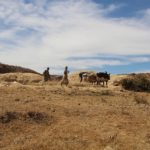A Look at Costa Rica Religion: Chastity, Obedience, Poverty


One interview made an especially big impression on me. I spoke with a nun in the Hermanas Misioneras de la Asuncion, a small order operating in Costa Rica, Nicaragua, and the Dominican Republic. The Hermanas work mainly in pastoral-social work with children and with the poor. They also study theology at Catholic Universities.
When I started interviewing this particular nun, I was struck by how serious she was about each theological point. And she was definitely not a liberation theologian. For those of you who aren’t theology nerds like me, liberation theology was a movement in Latin America that advocated doing theology from the perspective of the poor and oppressed. This seems pretty inoffensive to say now, but in the Catholic Church this idea was condemned as Marxist, materialist, and misguided. And that is still how mainstream churches see liberation theology, if they look at all.
And, to my surprise, she invited me to join their order! She told me there are only three vows I need to take: chastity, obedience, and poverty.
This particular nun was pretty wonderful to me. She answered all of my nerdy questions about theology and about her personal past without much reservation. And, to my surprise, she invited me to join their order! She told me there are only three vows I need to take: chastity, obedience, and poverty.
Well, the first vow probably wasn’t going to work out. My opinion is that sex outside of marriage isn’t a sin, so my perspective is pretty un-Catholic. I decided not to get into a big debate with her about it.
The second vow wasn’t going to work, either. Obedience isn’t really part of my personal vocabulary. I do have moral guidelines that I follow, but many of them are about resisting injustice rather than submitting to a Church authority.
The third vow, I think I could live with. Although my family lives comfortably, I’m not the type of person to go shopping all the time or own a lot of things. And I think that since I’ve been blessed with a lot, it’s my responsibility to live simply.
So these three vows made me a little nervous of revealing more of who I was to this woman, who clearly wanted to connect with me. How much of myself should I reveal? How much should I hide?
Most of the Ticos (Costa Ricans) I’ve met have been open with me about their discomfort with homosexuality or queerness in general.
When I travel to other cultures, I often have the chance to talk with religious people who are wonderful, and some who are not as wonderful. There are also times when I question what parts of myself I should present to religious people. Living in China and attending an evangelical church, I felt a little uncomfortable talking about my queerness. And now I’m experiencing the same feeling in my research here in Costa Rica.
Costa Rica’s culture is more queer-friendly than other cultures in Central America, but that doesn’t mean queers can be totally open here. Most of the Ticos (Costa Ricans) I’ve met have been open with me about their discomfort with homosexuality or queerness in general. Transgender sex workers are frequently the punch lines of jokes or just avoided. Also, sex in general is still pretty taboo to discuss, especially within families. As my Spanish teacher told me, every parent thinks their kid is a virgin, even if they know it isn’t true.
So, when the nun presented me with the three vows, I had to think about all of these factors. Did I want to risk alienating her and the whole order of nuns just to reveal more personal details about myself? As a researcher, I’m not required to tell interviewees everything about my personal life. Yet I felt dishonest hiding this really important part of my identity from her.
By offering those three vows to me, this nun was generously sharing her perspective and life with me.
I haven’t decided whether not saying anything about my reasons for rejecting the first two vows was right or wrong. Maybe this is one of those situations that just is how it is. I just know that it is really complicated to try to adapt your identity to a new and very different culture. Navigating cultural waters gets even more difficult when you bring religion in, too. The worldview of a conservative Catholic nun and a queer Jesus-person like me are obviously quite different, so how can we make a deep connection?
The most important part of travel, for me, is learning how to connect with somebody with whom you seem to have nothing in common. By offering those three vows to me, this nun was generously sharing her perspective and life with me. I decided to nod and smile, and leave confrontation for another day.

Top photo for A Look at Costa Rica Religion: Chastity, Obedience, Poverty by Pixabay.








